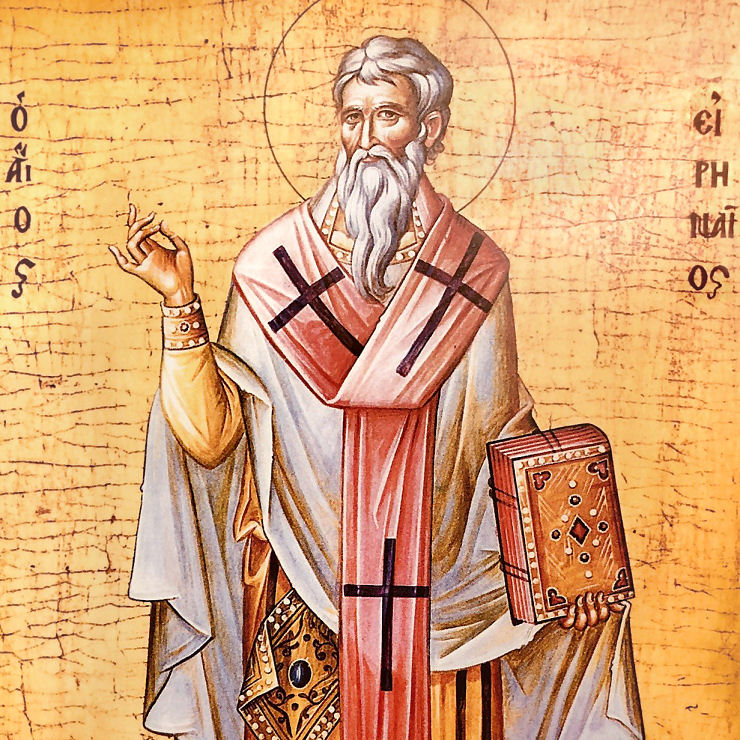
In an institution like the Church we naturally revere those ancient members who were associated with Christ himself, or at least with members of the next generation who had known His apostles and the earliest disciples.
St. Irenaeus was proud to have studied under St. Polycarp of Smyrna, for Polycarp had been a disciple of St. John the Evangelist. Along with this reverence went the saint’s sense of the importance of adhering to the doctrines handed down from apostolic sources. When in the late second century St. Irenaeus was called on to be the “founder of Christian theology”, in refuting the Gnostic heretics who were distorting Christian teachings, he appealed to the traditional teachings as the proof of their errors.
Irenaeus of Lyons was not Lyonnais by birth. He was born in Asia Minor, quite likely at Smyrna. There he received an excellent education and was ordained a priest.
As early as the second century a considerable number of Greeks were migrating from Greece to Gaul (the present France), and settling particularly on its southern coast and up along the Rhone River on which the city of Lyons was located. Irenaeus joined this migration in order to serve under St. Pothinus, the Greek-born first bishop of Lyons. There he worked not only among the expatriate Greeks but also as a missionary to the Gallic pagans. Since the Gauls were Celts, he took pains to learn their difficult tongue.
The name “Irenaeus” means “peacemaker”. The saint could not have been better named. In two instances, especially when diplomacy was required, he proved himself an able middleman. In the year 177, after a severe persecution had broken out in the Lyons area, the church at Lyons sent him as an ambassador to Pope Eleutherius in Rome to urge him to treat with mercy a group of their Asiatic friends who were in error but simply misguided. While Irenaeus was in Rome, the Roman magistrate of Lyons declared war on the local Christians, and executed Pothinus and a number of others.
Returning to Gaul, Irenaeus was elected bishop of Lyons to succeed St. Pothinus. Fortunately, the blood-letting was not renewed, so he held the episcopal post for the next twenty years. While the details of his years as bishop have not come down to us, one other peacemaking event is well known: Around 198 he successfully persuaded Pope Victor III to remove the excommunication that he had visited on some Eastern churchmen who celebrated the Pasch on a date different from the common one.
Even in writing against heretics, peacemaker Irenaeus sought more to reason with than to condemn. His deep knowledge of, and devotion to the faith often led him to express profound thoughts in his writings. He says of God, for instance, that “He is all thought, all will, all mind, all light, all eye, all ear, all fountain of every good.” Contrasting Eve and Mary, he writes, “The knot of Eve’s disobedience was loosed by the obedience of Mary.” It is good, he also observes, for us to have to struggle for a heavenly crown: “Those things that come to us spontaneously are not loved as much as those that are obtained by anxious care.”
But what impressed him most was that the Catholic faith was everywhere identical, whether among Germans, Spaniards, Celts, Libyans, Egyptians, or Mideasterners. “Just as the sun, that creature of God, is one and the same throughout the whole world, so also the preaching of the truth shines everywhere.”
If we want to know the truth, therefore, Irenaeus tells us, we need simply check the doctrine that has been passed down in the various dioceses traceable back to the Apostles, the church of Rome in particular. In listening to our bishop’s teaching, we hear Christ’s own teaching, he said: “for the Apostles, like a rich man in a bank, deposited with the Church … everything that pertains to the truth, and everyone whosoever wishes, draws from her the drink of life.”
How comforting is that reassurance! --Father Robert F. McNamara
God of peace,
who through the ministry of your servant Irenaeus
strengthened the true faith and brought harmony to your Church;
keep us steadfast in our true religion,
and renew us in faith and love,
that we may always walk in the way that leads to eternal life;
through Jesus Christ your Son our Lord,
who lives and reigns with you,
in the unity of the Holy Spirit,
one God, now and for ever. Amen. (English Missal)